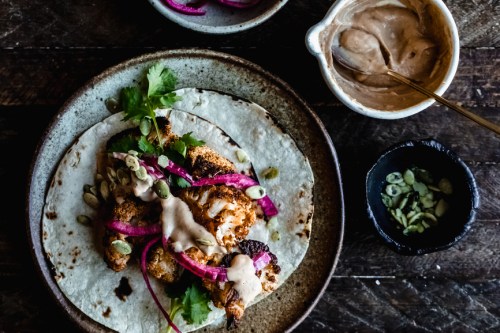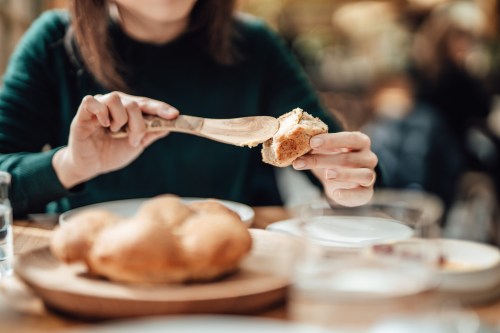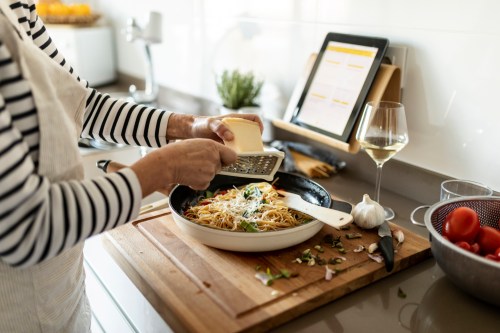Our editors independently select these products. Making a purchase through our links may earn Well+Good a commission
6 Anti-Inflammatory Herbs and Spices That’ll Give Roasted Veggies New Life (and Major Heart Health Benefits)
Maya Feller, RD shares six delicious anti-inflammatory herbs and spices for roasted vegetables: They'll add major flavor and health benefits.

It is a truth universally acknowledged that we can all benefit from eating more vegetables. The hindrance for some of us, however, is not feeling exactly inspired by (yet another) pile of raw romaine or spinach with a few diced tomatoes or croutons on top. Salads are great, yes, but sometimes a warmer, heartier way to let the delicious flavor of fresh vegetables shine is what we really want.
Experts in This Article
Maya Feller, MS, RD, CDN of Brooklyn-based Maya Feller Nutrition is a registered dietitian nutritionist who works with patients looking for nutritional management of diet related chronic illnesses with medical nutrition therapy. She is also adjunct faculty at New York University. Maya is dedicated to promoting nutrition education that helps the public to make informed food choices that support health and longevity.
In times like these, we look to roasting veggies, one of the quickest and foolproof ways to bring out maximum flavor of everything from cauliflower and carrots to broccoli, beets, leeks, and so much more. To add even more depth of flavor with approximately zero effort, you can level up even the humblest of roasted vegetables by simply seasoning them with the right herbs and spices before popping them in the oven.
FYI: When we say “level up,” we’re not just talking about making them tastier. Like vegetables, herbs and spices come from plants. That means that common seasonings contain bioactive compounds that give them anti-inflammatory properties that may help prevent an array of chronic diseases. These compounds also function as antioxidants. So, when you put vegetables and spices together, “it’s this extra nutritional bang,” says Maya Feller, MS, RD, CDN, CEO of Brooklyn-based Maya Feller Nutrition and author of The Southern Comfort Food Diabetes Cookbook: Over 100 Recipes for a Healthy Life.
All of the spices that Feller recommends for pairing with roasted vegetables owe their anti-inflammatory prowess to a number of different compounds, including phenolic acids, polyphenols, and flavonoids, “all of which work synergistically together,” she explains. “Both fresh or dry herbs are excellent—it’s really about the consistent intake and having them on a regular, frequent basis,” Feller says.
With that in mind, here are six anti-inflammatory herbs and spices—a number of which you probably already have in your pantry—that will elevate any roasted vegetable dish.
6 delicious anti-inflammatory herbs and spices for roasted vegetables
1. Red Chili Peppers
One of Feller’s top choices for seasoning roasted vegetables is red chili pepper, which get their heat from capsaicin, a powerful anti-inflammatory compound. Research has shown that capsaicin may be a boon to vascular and metabolic health and some findings suggest that it may also have anti-carcinogenic properties as well.
Feller is a big fan of sprinkling crushed or powdered red chili on roasted cruciferous vegetables, including cauliflower, broccoli, Romanesco broccoli, and Brussel sprouts. “Some cruciferous vegetables can be perceived as a little bit bitter, and I love to counter that with spice,” she says. Together, their flavors are perfectly balanced.
Ahem, did someone say what is Tajín? IYKYK.
This one-pan herby vegetable recipe would pair perfectly with red chili pepper:
2. Turmeric
Turmeric, a staple Southeast Asian cooking identifiable by its bright yellow color, is known to have “super powerful anti-inflammatory capabilities,” notes Feller. It owes those capabilities to a bioactive compound known as curcumin, an antioxidant that has been shown to help with inflammatory conditions, like arthritis. Curcumin also has cardiovascular benefits: “This compound has been shown to help reduce oxidation, especially around LDL, which is the not-so-good cholesterol,” says Feller.
Learn more about the benefits of turmeric and curcumin according to a dietitian by watching this video:
Feller likes to coat chickpeas with a blend of powdered turmeric, black pepper, ginger, and garlic (there is evidence that the combination of turmeric and black pepper significantly improves the body’s ability absorb curcumin) and then roast the chickpeas in the oven to make what she describes as a “good chickpea crunch that you can eat alone or put as a topper on a finished meal.”
3. Black pepper
Though often used in conjunction with other spices, black pepper on its own adds robust flavor to roasted vegetables, according to Feller, who notes that it contains a compound called piperine, which studies have shown to have anti-inflammatory benefits.
What can you put black pepper on? “Everything, everything, everything,” says Feller. “Whatever vegetable you’re putting in the oven, black pepper is absolutely delicious on top.”
4. Oregano and Rosemary
Although Feller notes that fresh oregano is not as common to use with roasted vegetables as, say, black pepper, she says that she cooks with it all the time and that it has similar health benefits to rosemary. “When we eat both rosemary and oregano, we’re getting tons of phenolic acids,” she says. “That’s where we’re getting the antioxidant and anti-inflammatory impact that is involved in vascular health. These compounds can also help manage blood sugar levels.”
Both perennial herbs are a great way to breathe life into roasted potatoes, like this delicious recipe for crispy batata harra. “I will do potatoes, or tri-colored potatoes, with a drizzle of olive oil, plus some oregano and rosemary, and it’s so simple and so good,” Feller says.
Try adding oregano and rosemary to this one-pan veggie hash recipe:
5. Cloves
Cloves are also on Feller’s list of anti-inflammatory spices, and with good reason: They contain an anti-inflammatory compound called eugenol that may help reduce the symptoms of arthritis. Cloves are sold whole and in powdered form. One of Feller’s favorite ways to incorporate cloves into meals is by mixing them with cinnamon (which has anti-inflammatory properties of its own) to flavor grains like oats or barley. For roasted vegetables, she recommends pairing cloves and cinnamon with squash. “You could do a squash, cut it in half, then put cloves and also cinnamon and nutmeg on the cut side and roast it in the oven. That would be very delicious,” Feller says.
Sign Up for Our Daily Newsletter
Get all the latest in wellness, trends, food, fitness, beauty, and more delivered right to your inbox.
Got it, you've been added to our email list.










